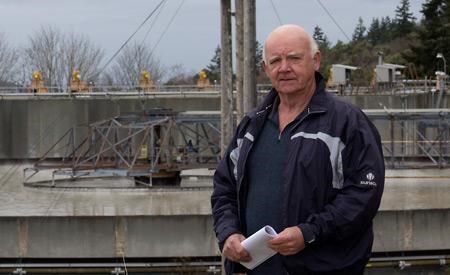Concerned members of the community packed City of Powell River council chambers April 17 in anticipation of a decision from council about the city’s liquid waste management plan.
On the meeting’s agenda was a recommendation to approve and forward the Stage 3 LWMP Draft 6, submitted by Opus DaytonKnight Consultants Ltd., to the ministry of environment (MOE).
The 252-page plan includes reference to the use of co-treatment, a plan to treat the city’s sewage at Catalyst Paper Corporation’s Powell River division facility, and to use the old clarifier, below the viewpoint in the Townsite, as a storage facility during mill shutdowns. The plan also promotes the development of a consolidated treatment plant.
Karen Skadsheim attended as a delegation on behalf of Townsite Ratepayers’ Association. She described residents’ concerns. “When it was in operation, that clarifier caused major odour issues for residents of Townsite,” she said. “It was ultimately decommissioned by the mill, in part, because of this reason. In May 2011 Townsite ratepayers asked council to remove the clarifier from consideration and council responded by passing a resolution to do just that.”
Skadsheim also questioned the public consultation process. She referred to a timeline that was accepted by the LWMP steering committee in June 2013, which stated that before the plan was approved by council and forwarded to MOE, a town hall meeting would be held to allow the public to review the plan, ask questions and receive answers.
She said the ratepayers ask that council remove all mention of use of the clarifier from the LWMP, remove Councillor Jim Palm as chair of the steering committee and reject the motion to send “this ill-conceived plan” to MOE for approval.
Retired mill employee George Orchiston said he did not believe the plan would work in the mill’s facilities. “The task before council is to ensure the ongoing treatment of the city’s wastewater during mill closures. The details in draft six of this report fails to give comfort to this key aspect.” Orchiston insisted the facility would be too big for the amount of sewage to be processed and would require an expensive retrofit.
His concern was addressed in a report by Paul Klopping, an expert in industrial treatment systems, who had reviewed Catalyst’s infrastructure and suggested the facility was capable of treating the city’s sewage. Klopping’s report had been received by city staff on the same day as the council meeting and had not been received by members of council. Tor Birtig, the city’s director of infrastructure, provided council with a brief summary of the contents of Klopping’s report. “He has not stated cost at all, other than to say that the process is feasible,” said Birtig.
Palm spoke to a concern in the media, that when the plan was submitted to MOE, the city would be committed to its proposal to use co-treatment to treat the city’s sewage. He said he was assured by MOE representative Trevor Hamelin this was not the case. Instead, MOE would review the plan and ask questions that at this point remain unasked and unanswered.
“As I have said in the steering committee meeting,” Palm said, “the sky is not falling. Powell River is still polluting out their doorstep. I can assure you, from the bottom of my heart, even though people are calling for my head tonight, we are simply trying to move the facts forward so we can move the process along.” He asked that the public consultation process be removed until all of the questions before council were answered.
Councillor Myrna Leishman suggested council needed time to digest the Klopping report. “The community is not behind this 100 per cent,” she added. “And when you have this kind of concern about the issues, it is only right that we hold this town hall meeting.”
The amended motion on the floor, as suggested by Councillor Debbie Dee and seconded by Leishman, read that the decision on the LWMP be deferred until Klopping’s report could be reviewed by council and until such time as all council members could meaningfully debate the report (Councillor Maggie Hathaway was absent). Further, the motion recognized the need for completion of public consultation before the LWMP is sent to MOE, and that all reference to the primary clarifier in any LWMP reports be removed. Council voted to accept the motion, Palm voted against.
Chief administrative officer Mac Fraser advised that as the removal of the clarifier created a substantive technical change, the matter should be referred back to staff.
Councillor Russell Brewer moved that the resolution go back to the LWMP steering committee. Seconded by Councillor Chris McNaughton, it passed unanimously.
A transcript of Skadsheim’s presentation to council is available here.



